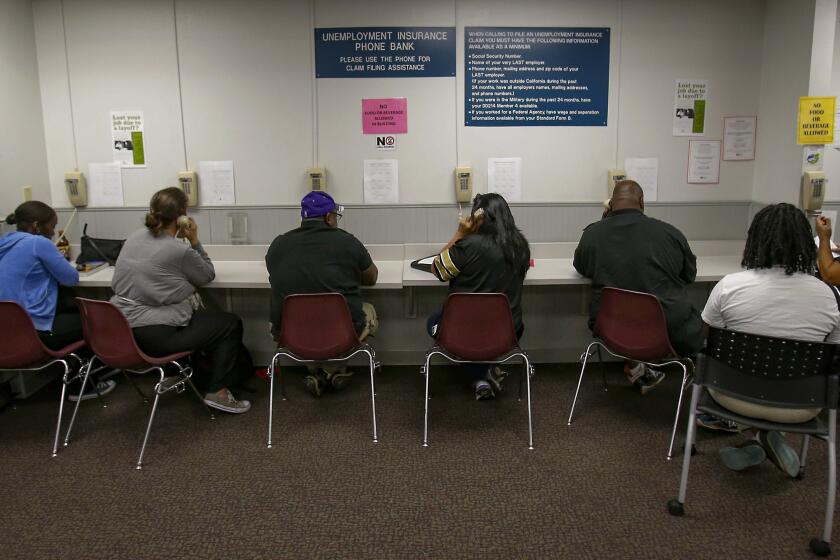Residual rumble
Today, writer-producer Craig Mazin and Web entrepreneur Matt Edelman discuss whether the causes of writers and other rank-and-file Hollywood workers overlap. Previously, they debated the traditional view of labor as it applies to writers and evaluated the proposed contract in the context of a rapidly changing digital market. Tomorrow and Friday, they’ll discuss new media and the tactics of the two sides in the strike.
We’re standing up for all rank-and-file
By Craig Mazin
Dear Matt:
Last weekend, there was a rally held by below-the-line employees, who banded together in an effort to protest the current strike and urge both parties back to the table. I have the deepest sympathy for not only below-the-line employees but anyone whose livelihood has been negatively affected by my union’s strike.
However, a lot of people out there seem to be operating under the false assumption that residuals are simply an issue of writers haggling for a bigger bonus.
This is false on a number of levels.
First, screenwriters don’t get “ownership” of their work. If we did, we wouldn’t qualify to be in a union.
Second, residuals are granted for the reuse of intellectual property, as I’ve discussed before. They are our version of royalties, and they are an integral byproduct of our authorship.
Third, it’s a misconception to suggest that we writers are willing to disrupt our industry in order to benefit ourselves and ourselves alone.
The answer to the question, “Why shouldn’t a sound editor, a soundtrack composer or a best boy get the same residuals consideration writers do?” is simple.
They should . . . and they do.
The Writers Guild of America isn’t the only union whose members get residuals. The Directors Guild of America gets residuals (for directors, assistant directors and unit production managers), the Screen Actors Guild gets residuals and, yes, the International Alliance of Theatrical Stage Employees (the union that covers almost all below-the-line employees) gets residuals. IATSE funnels its residuals into its pension and healthcare plan. Without those residuals, the plan would collapse.
And who sets the residual rate for an emerging market?
The first union to make a deal.
There’s no such thing as a good strike, and there’s no such thing as a good time for a strike, but anyone can see that Christmas is probably the worsttime. It’s incredibly upsetting to see people out of work, and I’ve called on my union to do more to help offset the collateral damage the Alliance of Motion Picture and Television Producers has inflicted.
Still, this isn’t a battle the writers are fighting only for themselves.
Should we fail, should the DGA fail, should SAG fail, then the members of the IATSE will discover what it really means to not get residuals. Their pension and health plan will disappear.
Averting that disaster is something everyone ought to support.
Craig Mazin wrote and produced the hit comedies “Scary Movie 3” and “Scary Movie 4” and recently wrote, produced and directed the feature film “Superhero!,” coming next spring from Dimension Films. He served on the board of directors of the Writers Guild of America, West from 2004 to 2006, and he runs the popular screenwriting blog The Artful Writer.
The writers’ cause isn’t everyone’s
By Matt Edelman
Craig, this is a hard counterpoint to write, as the issue speaks to core personal values and beliefs about what is right and wrong. You’re personally already on the side of “right” here, so we actually agree on many levels.
As a result, rather than focus directly on the question, I’m going to focus on just a part of your answer.
You referenced that while there is no good time for a strike, the first union that makes a deal sets the table for the rest of the unions, whose arrangements may resemble the terms secured by the first union. In other words, the reason you suggest that below-the-line employees should be supportive of the strike is that if the writers get a lousy deal, below-the-line employees will end up with a lousy deal as well.
I disagree with your logic and also find the conclusion incomplete.
I do not know any employees in any organization and profession who like having their ability to earn a living taken away from them. The writers strike has done that to the below-the-line employees. This group of professionals has nothing to do with the strike, yet if the writers did not strike, the below-the-line employees would be working.
Asking this group of hardworking individuals to be supportive of the strike contradicts your apparent understanding of the realities of their lives. These people may not be able to buy holiday gifts for their children. They’re mad, and they deserve to express their anger without being told they should be “supportive.” All they see is that the writers are holding out for tens of millions of dollars compared with the hundreds of millions that already exchange hands. I’d be mad too!
Maybe if the WGA spent more energy acting on the recommendations you’re making to help below-the-line employees, this group would have a more personal reason to be on your side.
I also don’t see that members of the IATSE have any meaningful stake in the outcome of the WGA negotiations. The reality that their residuals will be taken away because of the deal ultimately struck by the writers is virtually nonexistent; the studios may be cheap and unreasonable on certain issues, but they’re not vicious. Even more, there’s only so much money in the total residual “pie.” So the more the writers, actors and directors get, the less negotiating room there will be for below-the-liners.
The writers’ hearts may be in the right place, but there’s very little evidence that anything good is or can come out of this for below-the-line employees.
Best,
Matt
Matt Edelman is the CEO of PeopleJam (www.peoplejam.com), a lifestyle web site designed to enable people to make better life decisions through video, discussion forums and social networking. He has been a producer and executive in the film, television, Internet and mobile industries, where he has developed scripted, reality and interactive projects in live-action and animation.
| | Day 3 | |
More to Read
Inside the business of entertainment
The Wide Shot brings you news, analysis and insights on everything from streaming wars to production — and what it all means for the future.
You may occasionally receive promotional content from the Los Angeles Times.










